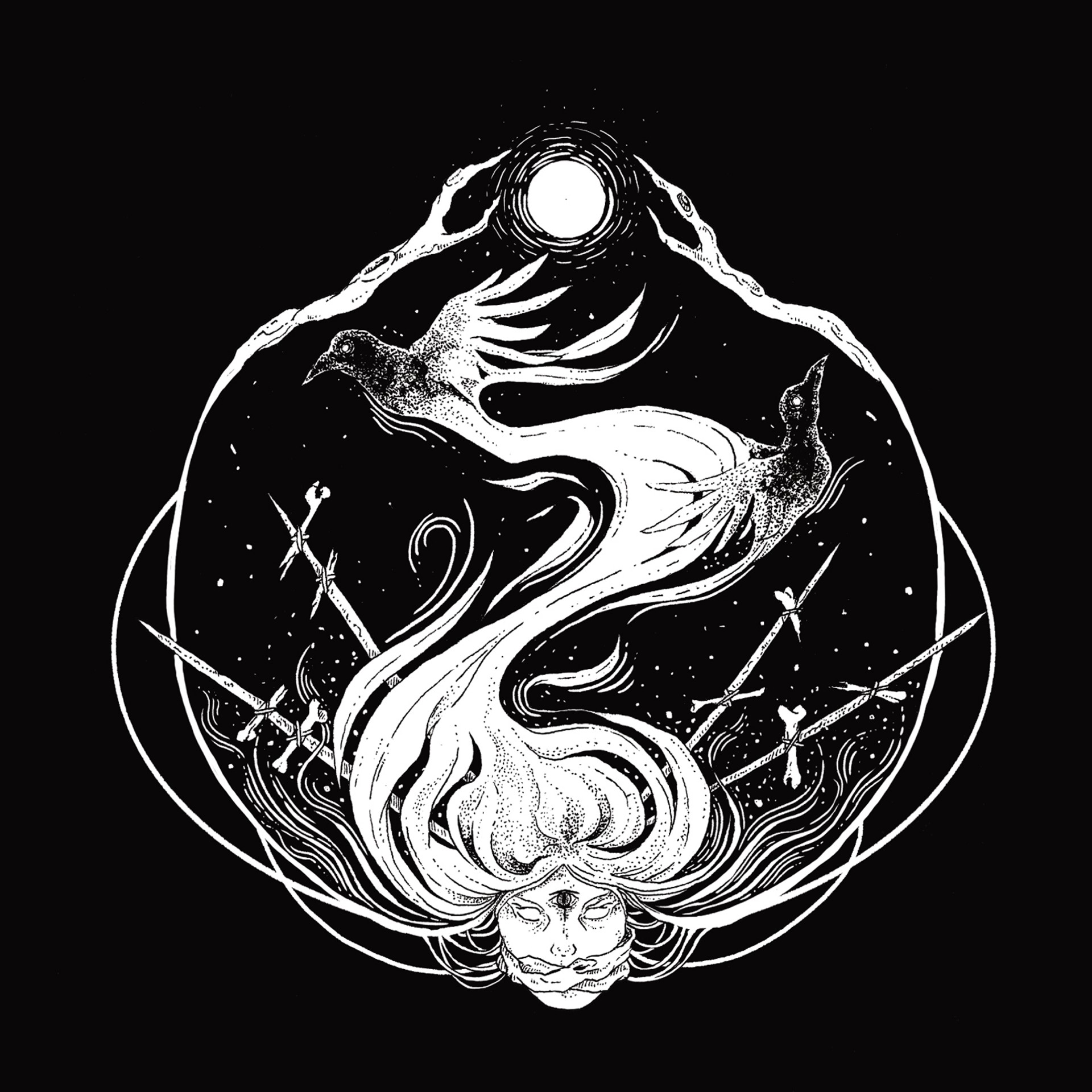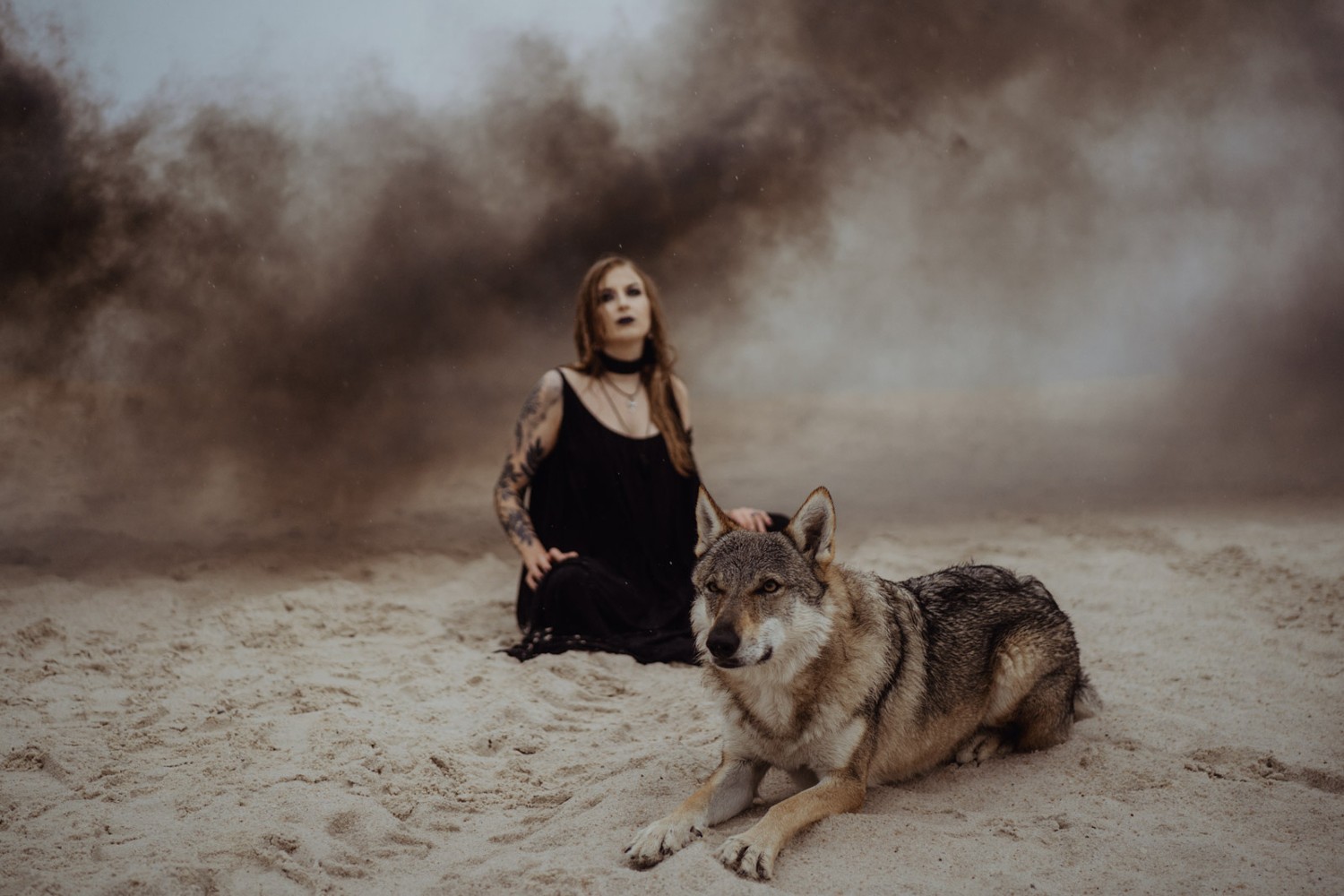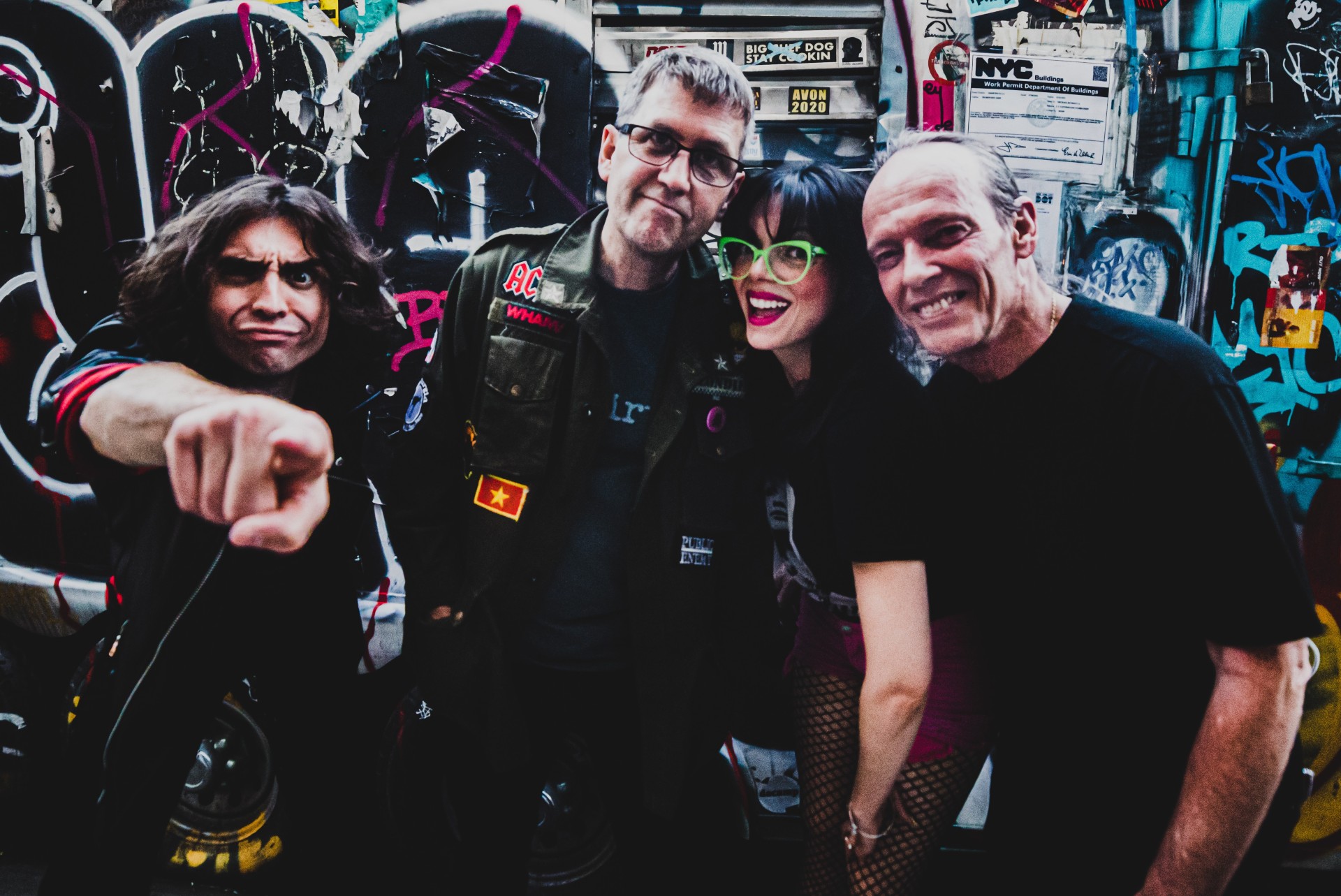Alternative/Rock
Track-by-Track: OLS Outlines Her Scintillating New Record ‘Pustkowia’
Ols, aka Polish singer-songwriter Anna Maria Olchawa, joins us for a detailed track-by-track rundown of each song on her latest release, ‘Pustkowia’ (Pagan Records).

There’s something always extra special when it comes to musicians who can do it all, such as the multi-talented Ols. The namesake of Polish singer-songwriter Anna Maria Olchawa, she writes all of the music and lyrics and plays all the instruments herself when writing and recording. Ols recently released her latest record, titled Pustkowia, via Pagan Records, an ambitious set of songs that are both very personal and relatable. The album is the heaviest, sharpest, and darkest work that Ols has ever recorded. There are some poignant themes explored through these tracks, such as emptiness, abandonment, rejection, and despair.
Despite these dark themes, Ols intended Pustkowia to be a beacon of hope. It’s dedicated to all those who don’t have a voice, the excluded, rejected, forgotten, and persecuted. And it’s not just restricted to people but to all beings who are suffering as a result of religions that put man above everything else and our desire for supremacy, which takes advantage of those who are unable to defend themselves. Within this context, each song provides something a little bit different, from more metallic-sounding tracks to vulnerable, almost lullaby-like numbers.
Joining us today for a track-by-track rundown of each song on Pustkowia is Ols herself, who provides a special look into the writing and recording of this record, and why it is so important to her.
1. “Pustacie” (Empty lands)
“For me, this song is a kind of ecological manifesto with an additional layer of deeper existential meaning. This post-apocalyptic vision is a vision of the future where inevitable destruction lurks. In a local, earthly sense, an ecological catastrophe; in a broader, cosmic sense, entropy and heat death of the universe. Everything is moving towards the ultimate void. Life is only a temporary anomaly in infinite non-existence. Humanity bestowed with painful self-awareness can just wander aimlessly through the wastelands, knowing that the only destiny is going to nowhere.
“The vision of a barren land is accompanied by personal threads related to rejection, exclusion, loneliness. Both of these perspectives are connected by the feeling of emptiness, a looming void to which everything ultimately comes down. Nothing will be left of our internal struggles and there won’t be a trace left of great world catastrophes, either. From the point of view of the cosmos, we are nothing, as is all the amazing diversity and richness of life on our planet. To see the irrelevancy of it all, it’s enough to look at yourself from the perspective of the universe with which we rush together, in every single second, towards destruction.”
2. “Ciemniej” (Darker)
“This is a journey into the inside. Each step into yourself is a step into the darkness, wherever new layers of shadows are revealed. Everyone who has this night inside them belongs to one tribe. We can easily recognize each other in the crowd. The darkness calls upon darkness; murk attracts murk… The tribe of the dark is not limited to people only. There are places sharing the same energy. Mountains and swamps, for centuries, considered the realms of dangerous powers, can sense this darkness within us and claim us as their own. That’s why people like us are drawn into the wilderness; they feel at home where darkness dwells.
“Musically, this song combines ritual hypnosis, emphasized by the trance-like, repetitive chants with metal means of expression. You can find there some demonic screeches, and in the background, there is an electric guitar tremolo playing through the entire song.”
3. “Głosy” (Voices)
“This track was born from my need to manifest the power of femininity and to give the voice to those who dared to be different, non-compliant, and therefore ended up being rejected by society. It’s both inspired by the centuries-long history of repression and the very recent political issues threatening women’s freedom.
“In ‘Głosy,’ by joining forces with sisters-witches, we regain the power of our own bodies. Proud of our wild energy, of our dark magic, primal and carnal, rejected by the world of diurnal creatures. In the marshes, we perform our rituals against the world that wants to limit our freedom. Celebrating our similarities, embracing our differences. The most important message of this song is that being different is your strength, and your sisters always watch over you. You’ll never walk alone.”
4. “Krąg” (Circle)
“This was created because a solstice song was sorely lacking in my work. It was strange, considering how important to me is the idea of circular time, eternal return, and renewing time through the ritual of chaos. It occurred to me that this is something beautiful, but also deeply sad, because, in this way, humans try to give their meaningless life a sacral dimension. They try to chase eternity with the void inscribed in circles, as I wrote in the lyrics. There, you can hear the echoes of Mircea Eliade’s works on mythical thinking, which is universal, applies to all possible traditional communities and has penetrated into the present day, so it can be valid even to the most modern human, if that person is sensitive enough. If anyone has doubts about what spirituality I want to write about in Ols, this is it.”
5. “Auf dieser einsam menschenfernen Höhe”
“This song started with an idea for a mesmerizing, lullaby-like, rocking track. It seemed reasonable not to introduce any lyrics that might disturb the trance I was planning to put the listener in.
“The title of this song is a fragment of an inscription on a memorial plaque on the First World War cemetery located on the top of the mountain in the Low Beskids in the Carpathians. Freely translated, it means, ‘on this lonely hill away from people,’ which is actually an accurate description of the location of this cemetery. These surroundings make it impossible not to imagine the dramas that took place in the last moments of the people who lie there.
“If anyone wants to really understand what was in my head while writing this piece, I recommend going there at dusk in late November. I assure you that then nothing more would need to be explained. It seems to me that this image fits perfectly with the theme of the whole album. It’s hard to talk about a greater emptiness and loneliness than dying alone in a foreign land, somewhere very far from your home. Especially when you die the most senseless death, not really knowing, for whom and for what… It’s such an extreme experience. If we are talking about emptiness in the human sense, it is probably impossible to experience anything more than this.”
6. “Pustka-Wschód” (Void-East)
“Initially, this piece was supposed to be about the Low Beskids Mountains and their abandoned villages. ‘Pustka-Wschód’ (Void-East) was written just after the release of the previous album, and quite some time ago, I asked my Ukrainian friend to record a recitation of a poem by Bohdan Ihor Antonycz, who came from Nowica, a village in the Low Beskids, but he was educated in Lviv and wrote in Ukrainian.
“When the war broke out a few months after the recording, I even thought of removing ‘Pustka-Wschód’ from the album altogether, because after what had happened, it was obvious that no one would be able to listen to a Ukrainian poem about deserted villages without thinking about current events. In the end, however, the song stayed, and I’m glad that I made such a decision. Now it’s multi-dimensional, and unintentionally, but rightly, joined the group of songs that comment on reality, leaving no doubt which side I’m on. ‘That is not only light that is born in the east; the darkness comes from there.’”
7. “Nie ma światła w oknach” (There is no light in these windows)
“The heaviest piece on the album. Probably the most needed. A scream that has long matured in my gut to get outside. To throw up the trauma. Obviously, to tell the story of my bad experiences, I needed to use the means more extreme than I usually do, but it came to me so naturally that I was surprised. This was a track that required virtually no vocal repeats. I stood in front of the microphone, started screaming, and it was just flowing. I screamed my guts out, I grabbed my guitars, bass, and pounded the drums.
“The recording of this track truly had a therapeutic, cathartic value. The lyrics are short, because nothing more needs to be said. I know what this song is about for me, and every person who has had similar experiences gets a place to write their own story here. I wanted people to take it and feel it their way.”
8. “Jad” (Venom)
“This is about crossing boundaries, touching the dark unknown, sacrificing yourself to the dark forces in exchange for knowledge. A gift requires the return of the same. In mythical, magical thinking, there must always be a balance. ‘Jad’ is another extremely personal track. In two fragments, musically and lyrically, it refers to the song from my first album, to ‘Water,’ where the motif of depression and suicide appeared for the first time. ‘Jad’ develops these themes. It’s about the darkness that’s calling. It’s a very true song. Because it’s really calling. I think I’m ready to start talking about my story, about the depression that, fortunately enough, I was able to come out from. But such an experience never really leaves you. This darkness keeps calling, sometimes quieter, sometimes louder, but I hear it always.
“Additional meanings to this song are added by the guest vocals of Mateusz Kujawa from Jarun, who perceived ‘Jad’ through the prism of his own experiences and transferred them into his vocal lines. There is our truth in this song, both mine and his. Each is different, dictated by subjective experiences, but both carrying a powerful emotional charge. Every time I hear this track, I feel its undeniable authenticity. And we both agree that this is what music is really about.”
9. “W zapomnienie” (Into the oblivion)
“This was created because I needed a short, atmospheric song to finish the album. This track resembles classic neofolk with truly sparing arrangement. I used just my vocals and the guitar. I fought a lot with my inner baroque artist not to put a billion tracks in there, but I won. The lyrics tell my own story, my journey from ruins to dead villages. This is how fate leads me: from one emptiness to the other, I carry an empty soul. In a way, it is a song that sums up the concept of the entire album. It’s a track that leads us to death, a song about slowly entering the void, coming into the nothingness with which we will eventually become one, and no one will remember us anymore.”
-

 Music3 days ago
Music3 days agoTake That (w/ Olly Murs) Kick Off Four-Night Leeds Stint with Hit-Laden Spectacular [Photos]
-

 Alternative/Rock5 days ago
Alternative/Rock5 days agoThe V13 Fix #010 w/ High on Fire, NOFX, My Dying Bride and more
-

 Hardcore/Punk2 weeks ago
Hardcore/Punk2 weeks agoHastings Beat Punks Kid Kapichi Vent Their Frustrations at Leeds Beckett University [Photos]
-

 Culture2 weeks ago
Culture2 weeks agoCirque Du Soleil OVO Takes Leeds Fans on a Unique, Unforgettable Journey [Photos]
-

 Alternative/Rock1 week ago
Alternative/Rock1 week agoA Rejuvenated Dream State are ‘Still Dreaming’ as They Bounce Into Manchester YES [Photos]
-

 Features3 days ago
Features3 days agoTour Diary: Gen & The Degenerates Party Their Way Across America
-

 Culture6 days ago
Culture6 days agoDan Carter & George Miller Chat Foodinati Live, Heavy Metal Charities and Pre-Gig Meals
-

 Music6 days ago
Music6 days agoReclusive Producer Stumbleine Premieres Beat-Driven New Single “Cinderhaze”
















